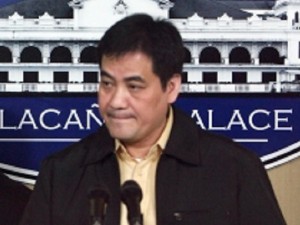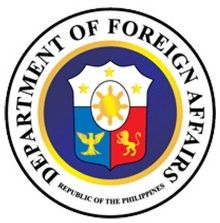MANILA, Philippines – The US Navy contractor accused of dumping hazardous waste on Subic Bay last month can’t invoke the Visiting Forces Agreement between the United States and the Philippines to seek cover from any liabilities, Malacañang said Saturday.
But the Palace saw no need for a separate investigation into the alleged dumping of toxic waste by a Glenn Defense ship on Subic Bay.
“To my knowledge, SBMA [Subic Bay Metropolitan Authority] already ordered an investigation, and we will ask them for the results,” presidential spokesman Edwin Lacierda said in a telephone interview.
He did not cite any timetable for the inquiry.
Lacierda also stood by the position of the Department of Foreign Affairs on the issue as he recognized the authority of SBMA to investigate Glenn Defense Marine Asia Phil., the US Navy contractor that allegedly dumped untreated toxic and hazardous waste on Subic Bay last month.
After conferring by phone with DFA spokesperson Raul Hernandez, Lacierda said, “The VFA applies only to US personnel but since the alleged dumping was not done by US personnel but by other nationalities, then VFA does not apply.”
Glenn Guardian, a vessel owned by Glenn Defense, reportedly dumped the hazardous waste after collecting it from US ships that participated in the recently concluded joint military exercises in the country.
The VFA, ratified in 1999, provides the framework for regulating the presence of US military forces and equipment in the Philippines, particularly during joint military exercises and port visits by US forces.
The controversial treaty allows the US government to retain jurisdiction over US military personnel accused of committing crimes in the Philippines, unless the crimes are of “particular” importance to the Philippines.
In a brief chat with reporters in the Palace following a joint press conference of President Benigno Aquino III and visiting Canadian Prime Minister Stephen Harper, Lacierda said the government would not object to the Senate inquiry called by Sen. Miriam Defensor-Santiago.
He said the Senate could always do so, apparently referring to the chamber’s legislative and oversight functions.
But he did not respond when asked if the latest incident could affect the Obama administration’s Asian pivot policy, a term for the US strategic shift to Asia-Pacific to maintain the balance of power in the region amid an increasingly aggressive China.
The Department of National Defense had said that regular port calls by the US Navy would continue despite the controversy generated by the dumping of toxic waste by the US Navy contractor.



